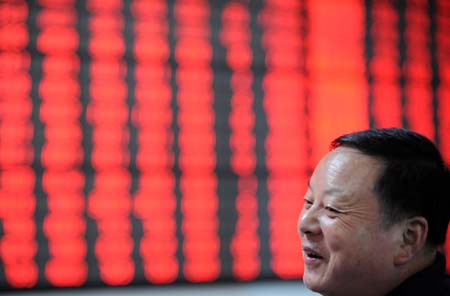Chinese equities racked up huge gains on Friday, rising almost 9.5 percent, after the government announced a series of market-boosting moves.
|
 |
|
A man smiles in front of an electronic stock price indicator board at a stock exchange in Hefei, capital of central China's Anhui Province, Sept. 19, 2008. Chinese shares prices had a rare single-day sharp rebound of 9.46 percent on Friday, after the government decided to scrap the stamp tax on stock purchase a day earlier among other announcements to boost the market. [Xinhua] |
By mid-day, the benchmark Shanghai Composite Index had already surged to 2,075.09 points, up 9.46 percent or 179.25 points, and that's where it closed. Most issues were already up the daily limit of 10 percent during the morning, boosted by the government announcements and a sharp overnight gain in the United States.
U.S. indices posted their biggest one-day gain since October 2002 after federal regulators said they might mount a financial markets rescue plan to create an entity like the Resolution Trust Corp. to absorb banks' bad loans.
The smaller Shenzhen Component Index ended at 7,154 points, up 9 percent or 590.93 points.
Almost all stocks on both bourses rose by the daily limit, except those for which trading was suspended on Friday. This latter category of stocks, comprised of companies of that report losses for two consecutive years, are allowed to rise no more than 5 percent.
Friday's rally ended a three-day decline in which equities lost almost 10 percent under the pressure of U.S. financial market upheaval. Despite the Friday gains, China's key index was still only at about one-third of where it stood at its peak in October, 2007.
The government said late on Thursday it would cancel the 0.1-percent stamp tax on purchasing shares. The tax on sales remains at 0.1 percent. The transaction tax rate was cut in April from 0.3 percent.
Investors reacted with enthusiastic buying, driven by the belief that this move indicated government resolution to keep boosting the market.
But combined turnover on both markets was just 65.5 billion yuan (9.5 billion U.S. dollars), compared with 63.1 billion yuan on Thursday, with many reluctant to sell because they believe that further gains lie ahead.
Heavy-weight oil producer PetroChina shot up 9.96 percent to 11.04 yuan, while Sinopec, the country's largest refiner, surged 9.96 percent to 9.94 yuan.
Sentiment was also bolstered by the day-earlier announcement from the government's investment arm -- Central Huijin Investment Co., Ltd. -- that it would buy shares of three major Chinese lenders on the secondary market to support their share prices.
The three lenders, the Industrial and Commercial Bank of China (ICBC), the Bank of China (BOC) and the China Construction Bank (CCB), experienced heavy losses during the three-day plunge, as banks were most hit by the credit crisis radiating out from Wall Street.
The country's largest lender ICBC rose 9.88 percent to 3.78 yuan, while BOC surged 10.16 percent to 3.36 and CCB rose 9.97 percent to 4.19 yuan.
Also on Thursday, the country's top state assets regulator said it was backing up its 147 centrally-administered state-owned enterprises to buy more stocks of their listed subsidiaries.
The package of support moves drew a mixed response from veteran investors, who've suffered amid the market's bear run that began late last year.
"I certainly welcome such government moves, because they will drive the share prices higher. But I doubt how long the rise could be sustained," said an elderly man who only gave his surname as Gao at a stock exchange outlet in Xuanwu District of Beijing. He has been investing in domestic shares for more than 10 years.
A lady surnamed Guan shared Gao's feelings. "I fear a deeper correction will emerge after several days of rises, the same as what happened when the government cut the stamp tax" in April.
"Investors are likely to be more prudent this time, after experiencing the prolonged sluggish market since the short-lived rebound in April," said Zhang Yong, a Great Wall Securities analyst.
(Xinhua News Agency September 20, 2008)